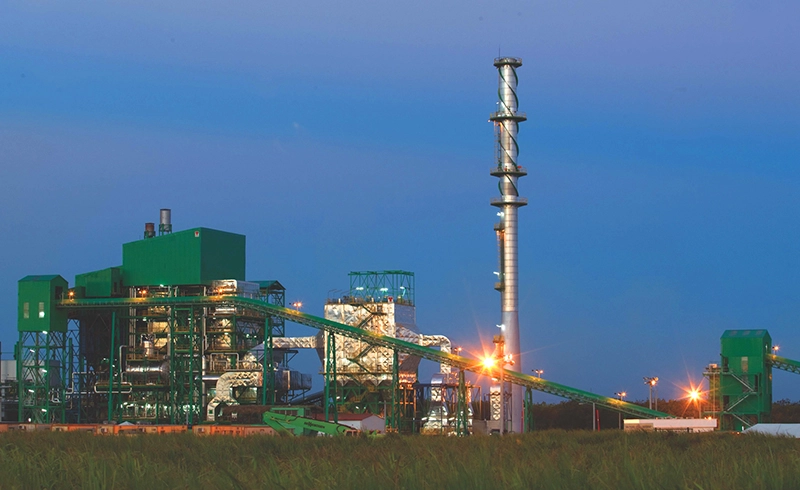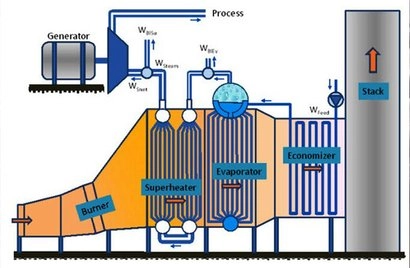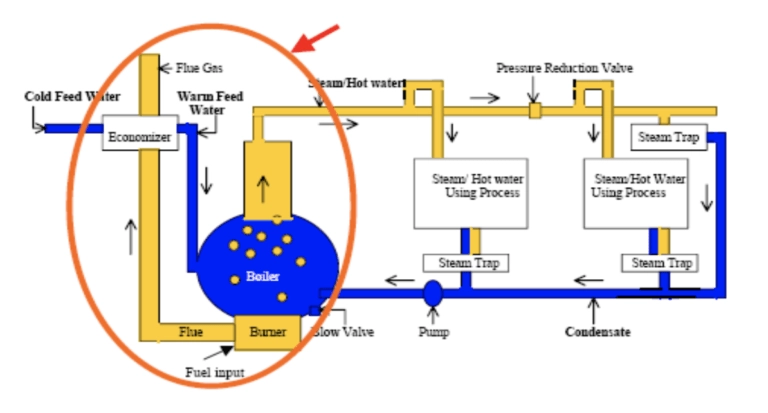
Le caldaie a vapore industriali variano nel prezzo da $5,000 A $300,000. I fattori che influenzano il prezzo includono il costo della caldaia stessa, Commissioni di installazione, e costi di manutenzione in corso. I prezzi per le caldaie a vapore industriali variano in base alle dimensioni, tipo di carburante, e classe di efficienza.
Cos'è una caldaia a vapore industriale?
UN caldaia a vapore industriale è una grande nave che genera vapore ad alta pressione per vari processi industriali. È progettato per riscaldare l'acqua e convertirla in vapore, che può essere utilizzato per il riscaldamento, produzione di energia, o altre applicazioni industriali. Le caldaie industriali sono comunemente utilizzate in settori come la produzione, produzione di energia, lavorazione chimica, e trasformazione alimentare. Sono disponibili in diverse dimensioni e configurazioni, a seconda delle esigenze specifiche del settore.
Ottieni un prezzo fisso online in 20 secondi:
Q Che tipo di carburante consuma la tua caldaia?
Come funziona una caldaia a vapore industriale?
Una caldaia a vapore industriale opera accendendo una fonte di carburante all'interno di una camera di combustione, generare calore intenso. Questo calore viene quindi trasferito in tubi pieni di acqua, causando il calore dell'acqua e trasformarsi in vapore. Il vapore è separato e diretto per alimentare vari processi industriali. Il vapore condensato ritorna come condensa, e misure di sicurezza e sistemi di monitoraggio precisi garantiscono operazioni efficienti e sicure in diversi settori.
Dopo che l'acqua viene convertita in vapore, Viaggia attraverso i tubi fino al suo punto di utilizzo designato. Può essere utilizzato per scopi come gli spazi di riscaldamento, alimentazione di turbine, o guidare i processi industriali. Durante questo processo, Eventuali solidi disciolti rimangono nell'acqua della caldaia quando viene prodotto il vapore.

Composizione della caldaia a vapore industriale
La composizione di una caldaia a vapore industriale può variare a seconda del design e dello scopo. Generalmente, Una caldaia a vapore industriale è costituita da diversi componenti chiave:
- Guscio della caldaia: Il guscio è la parte più esterna della caldaia che contiene la caldaia interna. Fornisce supporto strutturale e protezione contro il calore e la pressione.
- Camera di combustione: Conosciuto anche come la fornace, La camera di combustione è dove si svolge la combustione del carburante. Ospita i bruciatori e offre uno spazio per la fiamma e i gas caldi per interagire con le superfici dello scambiatore di calore.
- Superfici di scambiatore di calore: Queste sono le aree in cui il calore viene trasferito dai gas caldi all'acqua. Le superfici dello scambiatore di calore possono essere sotto forma di tubi, Firetubi o tubi idrici, o altre configurazioni a seconda del tipo di caldaia.
- Bruciatori: I bruciatori sono responsabili della combustione del carburante, Garantire una generazione di calore efficiente e controllata. Mescolano carburante (come il gas naturale, olio, o carbone) con aria e accenderlo per creare una fiamma.
- Sistema di circolazione dell'acqua: Le caldaie a vapore industriali hanno un sistema di circolazione dell'acqua che garantisce una circolazione continua di acqua, consentendo il trasferimento di calore dalle superfici dello scambiatore di calore in acqua. Questo sistema in genere include pompe, tubi, e tamburi.
- Sistemi di controllo: Le moderne caldaie a vapore industriali spesso incorporano sistemi di controllo avanzati che monitorano e regolano vari parametri come l'input del carburante, Livello d'acqua, pressione, e temperatura per ottimizzare le prestazioni e la sicurezza della caldaia.

Industria delle applicazioni della caldaia industriale
Le caldaie a vapore industriali hanno una vasta gamma di applicazioni in vari settori. Alcune delle industrie più comuni che utilizzano caldaie a vapore industriali includono:
- Produzione di energia: Le caldaie a vapore industriali vengono utilizzate per generare elettricità riscaldando l'acqua e producendo vapore per girare turbine che generano elettricità. Le centrali elettriche utilizzano grandi caldaie a vapore industriali per produrre elettricità affidabile ed efficiente per le case, fabbriche, e altre strutture.
- Industria chimica: L'industria chimica utilizza caldaie a vapore industriali per vari processi come le reazioni chimiche, distillazione, e sterilizzazione. Questi processi richiedono vapore ad alta temperatura, Controllo preciso della temperatura, e pulire il vapore per prevenire la contaminazione.
- Industria alimentare e delle bevande: Le caldaie a vapore industriali sono ampiamente utilizzate nell'industria alimentare per processi come la cottura, pastorizzazione, e sterilizzazione. Queste applicazioni richiedono un controllo preciso della temperatura e un vapore pulito per garantire la sicurezza e la qualità degli alimenti.
- Industria tessile: L'industria tessile utilizza caldaie a vapore industriali per processi come la tintura, filatura, e tessitura. Il vapore viene utilizzato per riscaldare l'acqua, generare le temperature necessarie necessarie per questi processi, e mantenere un preciso controllo della temperatura.
- Industria sanitaria: L'industria sanitaria si basa su caldaie a vapore industriali per i processi di sterilizzazione, come negli ospedali, Laboratorie, e impianti di produzione di dispositivi medici. Il vapore pulito è fondamentale per garantire la sicurezza dei pazienti e del prodotto.
Altre industrie che usano comunemente le caldaie a vapore industriali includono carta e polpa, petrolio e gas, e prodotti farmaceutici. Data la versatilità delle caldaie a vapore industriali, I loro usi tra le industrie continuano ad espandersi mentre le aziende cercano di migliorare l'efficienza, ridurre i costi, e soddisfare rigorosi regolamenti ambientali e di sicurezza.
Quanto dura la durata delle caldaie industriali?
La durata delle caldaie industriali varia in base a fattori come la qualità del design, pratiche di manutenzione, intensità di utilizzo, e il tipo di carburante utilizzato. In genere, Le caldaie ben mantenute possono durare ovunque 20 A 50 anni. Ispezioni regolari, manutenzione, e l'adesione alle linee guida operative raccomandate può estendere significativamente la durata operativa di queste attività industriali cruciali.
Qual è la differenza tra una caldaia commerciale e una caldaia industriale?
La differenza principale tra a caldaia commerciale e una caldaia industriale risiede nelle loro applicazioni previste e scala operativa.
1. Scala di funzionamento:
- Caldaie commerciali: Principalmente utilizzato in piccole applicazioni come gli edifici per uffici, alberghi, Scuole e ospedali. Forniscono principalmente riscaldamento e acqua calda per soddisfare la domanda.
- Caldaie industriali: Utilizzato principalmente in operazioni su larga scala come le centrali elettriche, fabbriche, raffinerie e piante chimiche. Forniscono il vapore o il calore necessari richiesti dai processi industriali.
2. Scopo e applicazioni:
- Caldaie commerciali: Utilizzato principalmente per fornire riscaldamento spaziale e acqua calda per piccole impostazioni commerciali o istituzionali. Sono progettati per un riscaldamento efficiente e l'approvvigionamento di acqua calda per soddisfare le esigenze di strutture specifiche.
- Caldaie industriali: Utilizzato in una vasta gamma di applicazioni industriali. In genere coinvolgono processi su larga scala che richiedono vapore o calore ad alta temperatura, come la produzione di energia, lavorazione chimica, raffinazione del petrolio, e trasformazione alimentare. Le caldaie industriali sono generalmente più forti e in grado di resistere a pressioni e temperature più elevate per soddisfare le esigenze specifiche dei processi industriali.
3. Design e caratteristiche:
- Caldaie commerciali: Impiegando un design semplice come una caldaia, Fornisce una soluzione di riscaldamento economica e richiede una manutenzione minima rispetto alle caldaie a tubo d'acqua più complesse. Sono progettati per un riscaldamento efficiente e affidabile in ambienti commerciali.
- Caldaie industriali: Disponibile in una varietà di design, compreso il tubo di fuoco, tubo d'acqua, ecc., A seconda dell'applicazione. Le caldaie industriali sono costruite tenendo conto della durata ed efficienza, Impiegando funzionalità avanzate per un controllo preciso, Alta efficienza e sicurezza.
Quali sono le caldaie industriali più comuni?
Esistono diversi tipi di caldaie industriali comunemente utilizzate in diverse industrie, tra cui:
1. Caldaie Firetube:
- Le caldaie a tubo di fuoco sono spesso utilizzate in piccole applicazioni industriali. Queste caldaie sono progettate come un guscio cilindrico con tubi che passano attraverso il centro del guscio. I gas caldi dalla combustione viaggiano attraverso i tubi, riscaldare l'acqua che circonda i tubi per creare vapore.
2. Caldaie a gallerie:
- Le caldaie a gallerie sono in genere utilizzate nei processi industriali su larga scala e nelle applicazioni di generazione di energia. Sono progettati con un guscio cilindrico a forma di tamburo, con tubi che trasportano acqua e vapore che attraversano il guscio. I gas caldi prodotti dalla combustione passano all'esterno dei tubi, che riscalda l'acqua all'interno dei tubi. Le caldaie a gallerie possono essere ulteriormente classificate in vari design, come il tipo A., O-Type, D-Type, o caldaie a tubi flessibili, A seconda della configurazione dei tamburi di fango e vapore.
3. Caldaie Elettriche:
- Le caldaie elettriche producono vapore o acqua calda usando l'elettricità anziché la combustione. Sono popolari per la loro efficienza energetica e un basso impatto ambientale, renderli adatti a tipi specifici di processi industriali.
4. Caldaie a biomassa:
- Le caldaie a biomassa utilizzano materiali biologici, come il legno o i rifiuti agricoli, come carburante per produrre vapore o acqua calda per i processi industriali. Sono popolari per la loro fonte di combustibile a basso contenuto di carbonio e rinnovabile, con alcuni modelli in grado di produrre energia pulita dai materiali di scarto.
5. Superheater a vapore:
- Le superheater a vapore sono dispositivi specializzati utilizzati in combinazione con le caldaie per produrre vapore ad alta temperatura, in genere per la generazione di energia o i processi industriali.
Quanto sono efficienti le caldaie industriali?
L'efficienza delle caldaie industriali può variare a seconda di diversi fattori come il tipo di carburante utilizzato, il design della caldaia, e pratiche di manutenzione, tra gli altri. Secondo Energy.gov, L'efficienza di una caldaia industriale può in genere variare 70% a finire 90% A seconda del tipo di caldaia e delle condizioni operative. Tuttavia, Energy.Gov rileva inoltre che la manutenzione e la messa a punto correttamente le caldaie possono migliorare significativamente la loro efficienza e le loro prestazioni.
Esistono diversi modi per migliorare l'efficienza della caldaia, come il miglioramento del controllo della combustione, Installazione di sistemi di recupero di calore, Migliorare l'isolamento, e usando bruciatori ad alta efficienza. Migliorare l'efficienza delle caldaie industriali può comportare un significativo risparmio energetico e ridurre i costi operativi e di manutenzione nel corso della vita della caldaia.
Prezzo della caldaia a vapore elettrico industriale
Il prezzo di una caldaia a vapore elettrico industriale può variare a seconda di diversi fattori come la capacità della caldaia, progetto, funzione, e posizione. Il costo delle caldaie a vapore elettrico industriale può variare $1,000 A $15,000 ogni, Andando a $60,000 o più per operazioni più grandi che richiedono più capacità e funzionalità. Tuttavia, Questi prezzi sono solo stime generali e dovrebbero essere considerati tali.
Oltre al costo della caldaia stessa, Ci sono costi aggiuntivi associati all'installazione, manutenzione e funzionamento in corso della caldaia. Questi costi possono variare in base a fattori come la disponibilità e il costo dell'elettricità, qualità dell'acqua, e requisiti normativi locali.
Conclusione
La corretta selezione della scala delle caldaie e delle attrezzature ad alta efficienza adatte alla domanda sarà uno dei fattori importanti per garantire il corretto funzionamento della produzione industriale. La scelta della giusta caldaia a vapore industriale può non solo aumentare l'efficienza e la sostenibilità della produzione industriale, ma ridurre anche il consumo di energia e l'impatto ambientale. Per aziende industriali, Questo è un passo importante verso lo sviluppo sostenibile e la produzione verde.
In caso di domande o hai bisogno di maggiori informazioni sulle caldaie a vapore industriali, Benvenuto per contattarci WhatsApp +86 132 1322 2805, Attendiamo con impazienza il tuo messaggio.



 Ricevi oggi stesso preventivi GRATUITI per caldaie locali
Ricevi oggi stesso preventivi GRATUITI per caldaie locali Confronta i migliori prezzi
Confronta i migliori prezzi Risparmia oggi stesso sulla tua nuova caldaia!
Risparmia oggi stesso sulla tua nuova caldaia! Ricevi oggi stesso preventivi GRATUITI per caldaie locali
Ricevi oggi stesso preventivi GRATUITI per caldaie locali Confronta i migliori prezzi
Confronta i migliori prezzi Risparmia oggi stesso sulla tua nuova caldaia!
Risparmia oggi stesso sulla tua nuova caldaia! Ricevi oggi stesso preventivi GRATUITI per caldaie locali
Ricevi oggi stesso preventivi GRATUITI per caldaie locali Confronta i migliori prezzi
Confronta i migliori prezzi Risparmia oggi stesso sulla tua nuova caldaia!
Risparmia oggi stesso sulla tua nuova caldaia! Ricevi oggi stesso preventivi GRATUITI per caldaie locali
Ricevi oggi stesso preventivi GRATUITI per caldaie locali Confronta i migliori prezzi
Confronta i migliori prezzi Risparmia oggi stesso sulla tua nuova caldaia!
Risparmia oggi stesso sulla tua nuova caldaia!
vVisualizza le recensioni dei nostri clienti
"La caldaia a vapore di Fangkuai è perfetta per la mia attività di trasformazione alimentare. Soddisfa tutti i nostri requisiti ed è molto affidabile. La qualità dei materiali e la costruzione della caldaia sono eccezionali. È anche molto facile da usare e mantenere, che ci ha aiutato a risparmiare tempo e denaro per la manutenzione. Consiglio vivamente le caldaie a vapore di Fangkuai a chiunque necessiti di soluzioni di riscaldamento affidabili."
Json
Brasile"I generatori di vapore di Fangkuai sono eccellenti. Sono molto facili da usare e richiedono una manutenzione minima. Anche il servizio clienti di Fangkuai è eccezionale. Sono molto reattivi e sempre disposti ad aiutare. Notevole anche l'efficienza energetica dei generatori di vapore, che mi ha aiutato a risparmiare sulle mie bollette energetiche. Consiglio vivamente i generatori di vapore di Fangkuai."
Maria
Spagna"Utilizziamo da anni la caldaia ad olio diatermico Fangkuai per il nostro impianto chimico e non ci ha mai deluso. La caldaia è molto resistente e può resistere a condizioni difficili. È anche molto facile da usare e mantenere, che ci ha aiutato a risparmiare tempo e denaro per la manutenzione. Le caldaie ad olio diatermico Fangkuai sono di prim'ordine e le consiglio vivamente a chiunque necessiti di soluzioni di riscaldamento affidabili."
Chang
Cina"La caldaia per l'acqua calda di Fangkuai è fantastica. Si riscalda in modo rapido ed efficiente, e l'acqua rimane calda per molto tempo. Non abbiamo mai avuto problemi e ha apportato un miglioramento significativo alle nostre operazioni quotidiane. Anche il processo di installazione è stato molto fluido e il servizio clienti è stato eccellente. Consiglio vivamente le caldaie ad acqua calda di Fangkuai."
Sara
Canada"L'attrezzatura ausiliaria di Fangkuai ha reso il mio sistema di caldaie ancora migliore. La qualità dell'attrezzatura è eccezionale ei prezzi sono molto ragionevoli. L'apparecchiatura ha contribuito a migliorare l'efficienza e le prestazioni del mio sistema di caldaie, che ha portato a notevoli risparmi sui costi. Consiglio vivamente l'attrezzatura ausiliaria di Fangkuai a chiunque necessiti di accessori per caldaie di alta qualità."
Maryk
UK"Ho acquistato una caldaia a vapore Fangkuai per la mia fabbrica e funziona perfettamente da mesi ormai. La qualità dei materiali e la costruzione della caldaia sono impressionanti. È anche molto efficiente dal punto di vista energetico, che ci ha aiutato a risparmiare sulle nostre bollette energetiche. Consiglio vivamente i prodotti Fangkuai a chiunque necessiti di soluzioni di riscaldamento affidabili ed efficienti."
John
Stati Uniti d'America"Sono rimasto molto colpito dalla qualità della caldaia per l'acqua calda di Fangkuai. È costruito per durare e ha superato le mie aspettative. Anche il processo di installazione è stato molto fluido e il servizio clienti è stato eccellente. La caldaia per l'acqua calda è molto facile da usare e manutenere, e l'efficienza energetica è notevole. Consiglio vivamente le caldaie ad acqua calda di Fangkuai."
Jack
Australia"Il servizio clienti di Fangkuai è di prim'ordine. Mi hanno aiutato a scegliere la caldaia perfetta per le mie esigenze e mi hanno fornito un grande supporto durante tutto il processo. Anche il processo di installazione è stato molto fluido e la caldaia ha superato le mie aspettative. È molto facile da usare e mantenere, e l'efficienza energetica è notevole. Consiglio vivamente i prodotti Fangkuai a chiunque necessiti di soluzioni di riscaldamento affidabili ed efficienti."
Giovanni
Messico"Il generatore di vapore di Fangkuai è perfetto per la mia piccola impresa. È molto facile da usare e richiede una manutenzione minima. È anche molto efficiente dal punto di vista energetico, che mi ha aiutato a risparmiare sulle mie bollette energetiche. Anche il servizio clienti di Fangkuai è eccellente. Sono molto reattivi e sempre disposti ad aiutare. Consiglio vivamente i generatori di vapore di Fangkuai."
Ahmad
Egitto